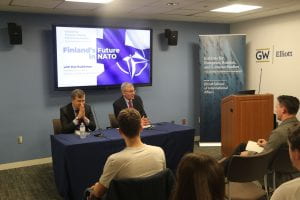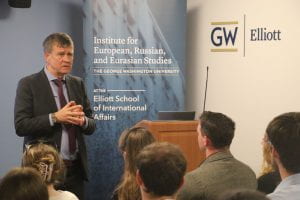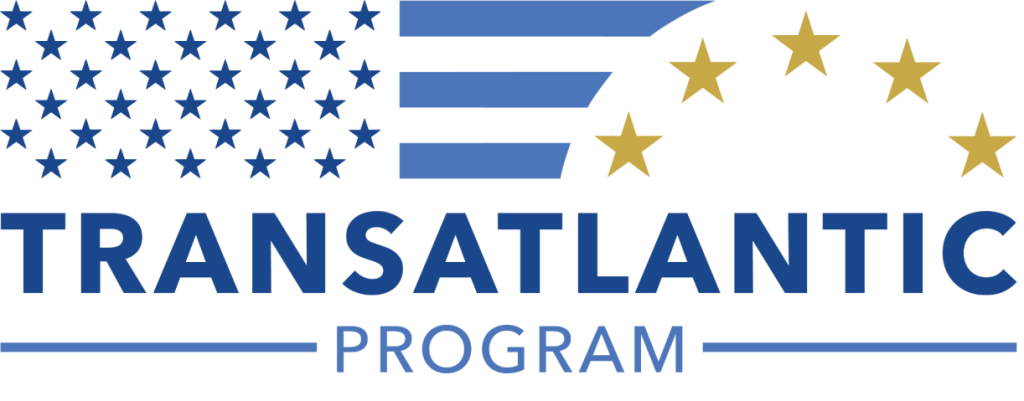
The Institute for European, Russian, and Eurasian Studies’ Transatlantic Program is dedicated to promoting engagement and research on the Euro-Atlantic region and to building connections between students, policymakers, and experts. The Transatlantic Program’s unique combination of relationships with partner organizations help to achieve these goals and to create opportunities for students and the university community. The Program has a Memorandum of Understanding with NATO’s Allied Command Transformation, and is also among the few U.S.-based recipients of a European Union Jean Monnet Center of Excellence – both of which create opportunities for engagement and research on Europe and the transatlantic region. IERES regularly hosts high-profile events and programs related to transatlantic and European issues, leveraging the Elliott School’s location at the heart of the Washington, DC policy community. Find more information about the Jean Monnet Center of Excellence, our partnership with NATO, and past events below.
Memorandum of understanding with NATO
The Elliott School’s partnership with NATO’s Allied Command Transformation, located in Norfolk, Virginia, marks George Washington University as one of NATO’s premier academic partners and creates numerous opportunities for students. Elliott School graduates enjoy privileged access to highly sought-after NATO internships by way of an internal pre-selection process. Among other events hosted with ACT, the Elliott School in recent years has welcomed Secretary-General Stoltenberg and successive Supreme Allied Commanders/Transformation, as well as conferences to launch ACT’s Strategic Foresight Reports. ACT staff also partner with ESIA to host yearly Model NATO simulations where students can familiarize themselves with NATO decision-making and learn from ACT’s staff and experts. Students also have the opportunity to submit successful policy essays to ACT for review and to participate in site visits at ACT’s headquarters.
Jean Monnet EU Center of Excellence
IERES’s Jean Monnet Center of Excellence acts as GWU’s cross-departmental, multidisciplinary hub of research and knowledge on the European Union, and fosters dialogue between society and academia on issues related to the EU’s global policies and internal dynamics. In particular, the Center of Excellence focuses on subnational governance and diplomacy between the EU, European actors, and their counterparts globally. The study of subnational governance through the Center of Excellence spans multiple policy issues such as climate change, economic links, and homeland security. As part of its mission to develop networks and promote research, the Center of Excellence hosts online round-table workshops among practitioners and experts; holds a yearly executive education course on subnational governance; and organizes conferences and events with high-profile EU guests.
Events
NATO Young Talents Workshop – March 17, 2024
On March 17th a group of GW students had the opportunity to participate in a workshop on NATO Allied Command Transformation’s (ACT) newest Strategic Foresight Analysis report and to engage with staff and experts from NATO ACT. Topics of discussion included geopolitical and geoeconomic challenges; disruptive technologies; strains on the architecture and norms of the international order; competition over the new global commons; the empowerment of human networks; the Women, Peace and Security agenda; and the security impacts of climate change & resource scarcity. The workshop included time for participants to participate in breakout sessions with ACT experts to discuss their own ideas and views on NATO’s strategic environment, as well as time for participants to hear from NATO’s experts. Students also had the chance to contribute their ideas and development of the Strategic Foresight Analysis, to learn more about how NATO approaches strategic foresight, and to get a more in depth perspective on NATO’s work.
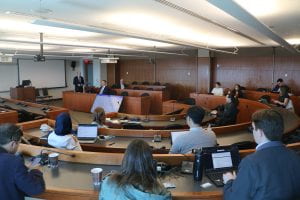
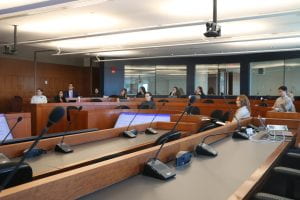
Model NATO Simulation – March 17, 2024
On March 29th IERES’ Transatlantic Program was privileged to host a Model NATO Simulation, during which GW students simulated a meeting of NATO’s North Atlantic Council under the guidance of staff from NATO’s Allied Command Transformation. Participants researched and represented the policies and preferences of individual member states in the context of a cybersecurity crisis. After the event, students engaged in a debriefing session, during which ACT practitioners reflected on the real-world echoes of the simulation’s outcome, and the debriefing session was followed by a panel on career development and pursuing careers in NATO.
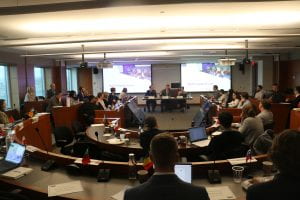
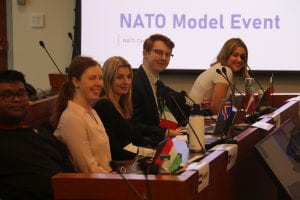
EU-U.S Cooperation on the Indo-Pacific: A Conversation with EEAS Secretary-General Stefano Sannino – February 7, 2024
On February 7th the Transatlantic Program hosted Stefano Sannino, the Secretary General of the European External Action Service, for an event on the state of EU-U.S. cooperation on Indo-Pacific policy. Secretary General Sannino addressed issues such as climate change and the green transition in the context of the Indo-Pacific, the EU’s relationship with rising powers like India, and how the EU’s relationship with China is developing. Subsequently, Secretary General Sannino took questions from Elliott school students and event attendees. Secretary General Sannino had traveled to DC to take part in the EU-U.S. High Level consultations on the Indo-Pacific, a framework of regular meetings for the EU and the U.S. interagency align their respective strategies.
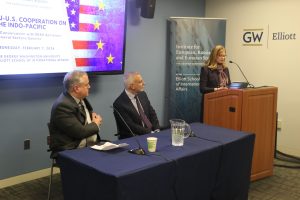
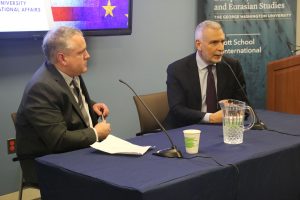
An Overview of EU-U.S. Relations and the Transatlantic Decarbonization Agenda Ahead of COP28 and Beyond: A Conversation with French Minister for Transportation Clement Beaune, Former Special Advisor to President Macron – November 6, 2023
On November 6th, the Transatlantic Program had the opportunity to host French Transportation Minister Clement Beaune for a discussion on the EU, transatlantic relations, and global politics. During the event Minister Beaune engaged in a Q&A session with the Director of the Transatlantic Program, Dr. Erwan Lagadec, and then took questions from Elliott School students. Minister Beaune addressed and offered his insights into a number of topics, including the outlook for Ukraine’s accession to the EU, the current state of the transatlantic relationship, Europe’s progress on sustainability initiatives and Europe’s Green Deal, and the war between Israel and Hamas.
NATO’s Strategic Challenges: A Conversation with SACT General Phillippe Lavigne – November 7, 2023
In advance of NATO’s 75th anniversary in 2024 and the Alliance’s 2024 summit in Washington DC, IERES’ Transatlantic Program had the honor of hosting General Philippe Lavigne, the Supreme Allied Commander of NATO’s Allied Command Transformation (ACT). General Lavigne began the event with remarks on ACT’s role in NATO, discussing emerging threats and challenges, current changes in the character of war due to technological changes, and how ACT helps adapt the Alliance through ACT’s Strategic Foresight Analysis and development of new strategic concepts. General Lavigne also took questions from attendees on topics like the impact of climate change NATO’s security environment, NATO’s role in arctic security and how Sweden and Finland’s accession to NATO affects the Alliance, and NATO’s place in a multipolar world with increasing diversity of security threats. To end the event General Lavigne spoke on opportunities for students with ACT and NATO, such as ACT’s Innovation Hub and opportunities for internships.
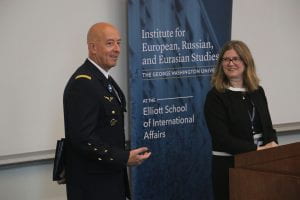
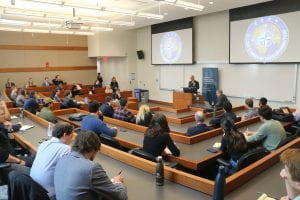
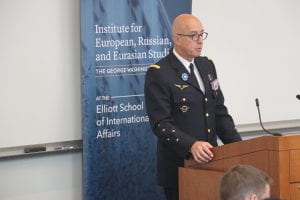
Finland’s Future in NATO: A Conversation with the Finnish Embassy – October 19, 2023
On October 19th the Transatlantic Program held an event with Mr. Esa Pulkkinen, the Permanent Secretary at the Ministry of Defence of Finland. During the event Mr. Pulkkinen spoke on Finland’s path to NATO membership, the integration of Finland into NATO, and Finnish security policy. Mr. Pulkkinen also engaged in a Q&A section with GWU students, where he addressed topics ranging from Baltic and Arctic security to how Finland is responding to hybrid warfare and efforts to increase societal resilience. The event was moderated by Christopher Kojm, a Professor of Practice and the Director of the Leadership, Ethics and Practice Initiative at the Elliott School of International Affairs.
